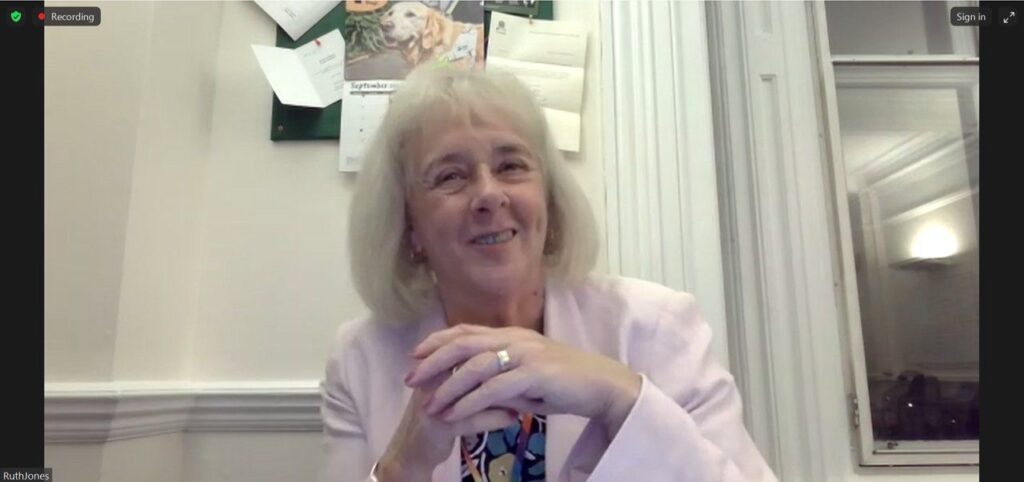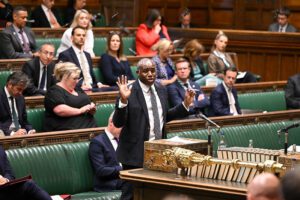Ruth Jones’s Early Career
Ruth Jones is a rare figure in politics, having opened her career not in policy or business, but in public health; she was a physiotherapist for 32 years before becoming a trade union full time officer. But, as she explained, this is not as great a discrepancy as it may at first seem: “in both roles, you’re advocating for people; you’re representing patients or clients or staff”.
She repeatedly draws on her NHS experience during the webinar, testament to the fundamental, formative training she garnered from her work: although not centred in public policy, clearly of invaluable worth for human skills, team leadership and unified values.
She explained that “as a member of staff, I was always part of a team”; regardless of status or role, as a manager of a team of 50, she “could never have done that job without the cooperation of the team” – a constantly evolving and diverse team of “admin, support workers, cleaners, porters”. Her work gave her a deep understanding of the “spirit of teamwork”: “everybody had to work together to make sure we got the best for the patient or the client that we were working with”.

“Health is a massive issue. The NHS is a national health service, but at the moment it seems to be a national sick service” ~ Ruth Jones MP
Ruth Jones’ entry into politics
Frustrated by her limited power to affect real, tangible change during her time as a trade union officer, Jones swiftly learnt that “you need to get higher up the food chain to actually make a difference”. From campaigning in unwinnable seats to winning her home seat in 2019, Jones’ political career saw her return to her homeland, having lived in her victorious constituency for most of her life, and having been a Labour member for over 20 years.
Ruth Jones’ loyalty to, and firm sense of, the importance of Welsh identity spans back to her political inspirations. She cited Nye Bevan and Neil Kinnock – “brilliant orators, passionate, powerful and really strong advocates for their local community”. She endeavours, through her roles as constituency MP and Welsh Select Committee chair, to emulate their sincerity; to serve as a “passionate representative of her patch”.
‘Nye Bevan and Neil Kinnock were brilliant orators, passionate, powerful and really strong advocates for their local community’ ~ Ruth Jones MP
Welsh Affairs Committee Operations
As Chair of the Welsh Affairs Select Committee, Ruth Jones outlined the Committee’s cross-party remit to examine how Westminster policy affects Wales and to scrutinise the UK Government’s engagement with devolved institutions.
“We work together – Labour, Plaid Cymru, the Conservatives and the Liberal Democrats – to get the best outcomes for Wales“, she explained, highlighting the difference between a Select Committee’s modelling on collaboration and balance, and the often adversarial nature of Prime Minister’s Questions.
The Committee focuses on issues effecting people in Wales, specifically retained powers such as justice, immigration, and defense. Its current inquiries include prisons, probation and rehabilitation; the economic regeneration of coalfields and the steel industry; and the impact of trade and inheritance tax on Welsh farmers. The Committee questions the Secretary of State for Wales twice a year and invites the First Minister from the Senedd, a partnership crucial for avoiding overlap and ensuring comprehensive coverage of issues, particularly regarding devolved powers like health and education.
Cross-Border Health and Social Care
Upon Fatima Kamara’s questioning on the most important areas of healthcare reform facing the UK Government, Jones’ response was immediately impassioned: “Health is a massive issue. The NHS is a national health service, but at the moment it seems to be a national sick service”. She insisted that Government should be looking at “far more” preventative health promotion and ill health prevention in order for “people to live long, happy and healthy lives”: “it’s no good living to the age of 90 if you’re bedbound for 10 years”.
Another crucial point made, and one clearly influenced by Jones’ career in healthcare, was that the UK needs “to have a long term view on health”. She referred to the Smoking White Paper of the 1970s to 1990s which linked cancer to nicotine – but highlighted that it “didn’t actually show results for 30 years because people were still smoking”, resulting in no decrease in cancers for 20 years. Healthcare developments, she insisted, happen far outside the parliamentary terms, which is why they prove so challenging to push through – but are all the more vital for their comparative ostensible lack of urgency, when pitted against more short-term solvable issues.
Ruth Jones praised the teamwork that underpins the NHS at every level and urged closer integration between hospitals, community care, and local authorities to reduce pressure on services. However, she feels, health and social care systems must increasingly operate together if hospital backlogs and patient flow are going to be better handled.
With heightened focus on Wales, Jones expressed how the country faces the challenges of an older, sicker population and the emigration of younger generations, leading to a shortage of care staff. She explained how “we need young people, at the very basic level to look after our older people”.
Although the Welsh Government has legislated Wales as a country of sanctuary, welcoming skilled immigrants to fill vacancies, particularly in the NHS, delays in processing legislative papers for refugees and asylum seekers prevent them from working. Such issues exacerbate staffing shortages and negatively impact both their and patients’ well-being.
“We need young people, at the very basic level to look after our older people” ~ Ruth Jones MP
Skills, Migration and the Welsh Workforce
Ruth Jones’ positive, welcoming stance on immigration is clear, albeit, self-admittedly, “going against the rhetoric that’s out there in terms of England in quite a strong way”. Jones describes how her mother, recently in hospital, was treated by a “brilliant” network of staff whose “vast majority were from overseas”: “they were non-white, from overseas, and they were absolutely superb”.
“Well, I’m not being funny, you’ve been retired 20 years. They’re not taking your job, they are filling a vacancy which is not your job and they don’t want your job because to be honest, they’re very highly qualified as a lawyer, a barrister, whatever. They want to come in and give to the country that has taken them in’’ ~ Ruth Jones MP
Jones expressed her frustration, empathising with foreign workers who struggle to attain their right to remain and legislative papers dealt with – “during that time, you’re not working, you’re existing on a pittance, you’re dealing with your family, you’ve got nothing. It’s bad for your mental health, it’s bad for your physical health, it’s bad for your family”.
She emphasised how the Government should prioritise getting such people into work: we can do that, “it’s not that difficult” – but political, social pressures and red-tape are debarring Labour from swifter action.
“We need to ensure that working people have hope, because you can have all the stability and all the talk about growth, but if you haven’t got hope, then people just do lose heart” ~ Ruth Jones MP
On the sorts of arguments espoused by right wing spokespeople such as Robert Jenrick and Nigel Farage, she is scathing and blunt: “somebody said, in my constituency, “oh, they’re coming, they’re taking my job”. And I said, “Well, I’m not being funny, you’ve been retired 20 years. They’re not taking your job, they are filling a vacancy which is not your job and they don’t want your job because to be honest, they’re very highly qualified as a lawyer, a barrister, whatever. They want to come in and give to the country that has taken them in””.
Jones wants to dismantle the “right wing rhetoric which says they’re freeloaders, they’re coming in to get the benefit”. They don’t want the benefit, she argues; “they want to give back”. She describes the result of proper integration as a powerful tool for enhancing the community: they become a family, paying taxes, being involved in the community: “So do you know what? I think we should welcome them with open arms”.
‘I think we should welcome them with open arms’ ~ Ruth Jones MP
Energy Transition and Economic Growth in Wales
Ruth Jones emphasises how Wales is well-positioned to capitalize on natural energy resources due to its geography: “we’ve got wind, we’ve got solar and we’ve also got tidal”. She expressed her keenness to establish a reliable and secure energy system independent of external geopolitical influences.
Jones also set out the key challenges for renewable energy in Wales, which will increasingly include connecting renewable sources to the national electricity grid, especially in mid-Wales, and developing battery storage solutions to capture and release energy as needed.
She celebrated Newport’s innovative clean energy transformation: a city boasting the largest semiconductor cluster in the UK, as well as multiple data centers, which are power-hungry and require robust renewable energy infrastructure.
Future Priorities
Ruth Jones explained the Government’s heavy emphasis on ‘growth and stability’, but has a more human message to deliver: ‘But what we do need to do is ensure that working people have hope, because you can have all the stability and all the talk about growth, but if you haven’t got hope, then people just do lose heart’.
She continued, expanding on the Government’s focus on apprenticeships, training and increased employment levels: ‘Jobs, jobs, jobs, yes, of course, but not just jobs at any cost. We want decent jobs which are well paid’.
And permanence: Jones believes in creating jobs for good, and for the long term – jobs still existent for the next half century – also something that she feels will prove crucial for communities.
‘Jobs, jobs, jobs, yes, of course, but not just jobs at any cost. We want decent jobs which are well paid’ ~ Ruth Jones MP
Ruth Jones’ overarching values rest on a celebration of both small-scale community togetherness, and cooperation on a national level; in short, unity. It is a value which has guided her from before her political journey even began, when she became aware of the power of a healthy and supportive hospital team. And it is a value which, in today’s climate of social entropy, is more apt than ever.
Ruth Jones’ words on immigration were refreshingly honest; Labour continue to remain circumspect about their rhetoric on the issue given the UK’s immense public backlash, but Jones’ support of an ‘open-armed welcome’ is a bold gambit, promising and hoping for deeper community integration for both Brits, and people from around the world.



